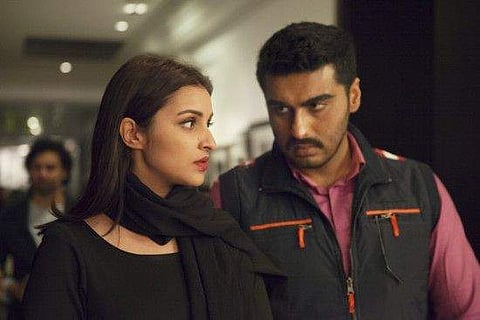Sandeep Aur Pinky Faraar Movie Review: A disappointing Dibakar Banerjee ride
Rating:(2 / 5)
Bright red text on a black screen. Snatches of idle chatter. A Dibakar Banerjee film has announced itself even before it can start. No other director in India commands such urgent attention, a feeling sorely missed in the last six years. His last feature, Detective Byomkesh Bakshy!, was a bland and hyper-stylised genre piece. Sandeep Aur Pinky Faraar returns him to the old road — the weirdness and sprawl of North India.
The title is a trick, with a sly switching around of names. “It happens among Sikh women,” explains Sandeep Kaur (Parineeti Chopra) to Pinky (Arjun Kapoor). Pinky is a cop, already emasculated by his nickname and running for his life, who proceeds to slap Sandeep. Later, as they sit by a creek and talk, he’s unable to wrap his head around her past. “You’re selfish,” he croaks — the insecure male's response to a complicated woman.
Though there are flashbacks to rely upon, this scene doubles as a neat summary of the plot. Sandeep, a banker, is in trouble; she had helped orchestrate a major financial scam and wanted out. When her boss refused to let her go, she threatened to expose him. A corrupt cop (Jaideep Ahlawat) is assigned to have her killed, but fails when Pinky, the suspended officer he’d sent to pick her up, gets wind of the plan. On the run, Pinky panics and tries to finish her off himself. But something stirs inside him, complicated by the fact that Sandeep is pregnant with her boss’s child. “Use head, not heart,” he tells her — though he himself can’t.
Cast: Arjun Kapoor, Parineeti Chopra, Jaideep Ahlawat, Raghubir Yadav, Neena Gupta
Director: Dibakar Banerjee
After such a tense start, the film eases into a lull. Sandeep and Pinky make a pit stop up at Pithoragarh, a small Himalayan town near Nepal. An elderly couple (played by Neena Gupta and Raghubir Yadav) takes them in, and the pace halts for a while. This is typical of most chase films, giving characters a chance to breathe or get to know each other well. Dibakar, though, struggles to fill this space convincingly (the film is co-written by Varun Grover). It’s a bit sad to see the director of Khosla Ka Ghosla fumble amateurishly with domestic comedy. Neena and Raghubir make fun, colourful hosts, but fail to blend into the main action. Their closeness with Sandeep, whose scheme they’ve unwittingly invested in, is played up for effect, though there’s a funny moment when an enraged Raghubir asks her, "What's your locus standi?"
The film does regain its urgency in the second half. Sandeep gets a local bank manager (a striking Sukant Goel) to help them out, which alerts the cops to their location. Pinky, meanwhile, wants to ditch her and run. It’s not the most suspenseful ploy, since he has already had a change of heart and is likely to have another. This is a recurring problem with the film. Dibakar is big on twists, yet his predictable characters keep giving them away. You get a sense he had set out to make a simple love story, got cold feet and burrowed into his reputation as a serious filmmaker. The dialogues are occasionally funny but can’t measure up to the screwball comedies of old — so many of them about couples on the run. It’s no surprise that the film’s best scene, when it comes, happens during a dance, with the stern Pinky cutting a rug and a bemused Sandeep watching him from far.
That scene also reminds us why Arjun and Parineeti were an essential pairing in Ishaqzaade (2012). The actors have a natural pivot towards each other, which tends to come out on the go. Weirdly, every time there's a vehicle around — a car, a train, a truck — their chemistry clicks into place. That the film keeps trying to pin them down is unnecessary, and ends up working it against it. “Love has its limitations,” Jaideep's cop muses near the end. It’s the falsest line I’ve ever heard in a Dibakar Banerjee film.

